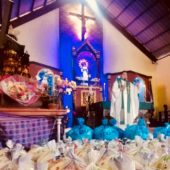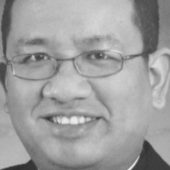A priest, a nun and a lay religious stand trial in the Philippines for defending human rights.
Rev. Wilfredo Ruazol, Sr. Elenita Belardo and Edita Burgos, respectively, are respondents in a criminal lawsuit filed by a former top-ranking Philippine military official, accusing them of falsifying documents in support of a now dismissed case and thus perjuring themselves in court.
These faith leaders are from human rights defenders’ groups Karapatan, Rural Missionaries of the Philippines (RMP) and Gabriela, co-petitioners for writs of amparo and habeas data filed at the Philippine Supreme Court in May 2019.
Said organizations filed for the writs hoping for a legal remedy against the repeated and public red-tagging and terrorist-labelling by the state.
Retired Gen. Hermogenes Esperon, one of the petition’s respondents, charged the petitioners with perjury only days after the Court of Appeals, to whom the case was referred, dismissed the groups’ petition.
The charge banks on the allegation that RMP’s registration with the Securities and Exchange Commission (SEC) was already revoked at the time of the filing and that Belardo “deliberately lied” about its corporate status.
Esperon was the national security adviser to then President Rodrigo Duterte and the vice chair of the National Task Force to End Local Communist Armed Conflict (NTF-ELCAC), the government agency seen by critics as a saboteur of the peace talks and a mastermind for red-tagging and other attacks on human rights defenders.
All petitioners but Sr. Belardo were cleared of charges in November 2019.
Esperon revived his perjury charges against all petitioners in February 2020. It is now being heard at Branch 139 of the Metropolitan Trial Court in Quezon City.
“Good faith”
Sr. Belardo belongs to the Religious of the Good Shepherd (RGS). She is known for her meek character and is highly respected by peers for her faithful devotion to her religious vocation. She was RMP’s national coordinator when the petition was filed in May 2019 and, thus, represented the religious organization.
The octogenarian religious denied she perjured herself and misrepresented the RMP. She said it was in good faith that she believed RMP was properly registered with the SEC since the latter continuously received its reports.
“I am at peace because I did not lie,” Belardo, who is a veteran land reform and peasant’s rights advocate, said when she testified on June 20.
Esperon had repeatedly red-tagged RMP as a “communist legal front” that used its resources to support communist rebellion. RMP filed a complaint to the Commission on Human Rights (CHR) and the petition for the writs in 2019 seeking to deter further vilification.
The government’s Anti-Money Laundering Council froze RMP’s bank accounts in December the same year for “terrorism financing.” In October 2020, all other bank accounts of the organization were placed under “asset preservation” based on a court order.
RMP vehemently denied the allegations of working for communist organizations and slammed the government’s smear campaign.
“Truth-tellers”
Burgos, a consecrated lay religious of the Secular Order of Discalced Carmelites, faced the prosecution on July 11.
Burgos is a staunch human rights advocate, the wife of press freedom icon Jose Burgos and mother of Jonas Burgos, an activist abducted by the military in 2007.
Burgos denied the crime being attached to Belardo, herself and her co-petitioners.
“Isn’t it funny that the one accused of lying is called upon [in court] to tell the truth,” she wrote in an article after the hearing.
When the prosecution asked why she believed RMP did not perjured itself, Burgos said she was close to many religious and knew that it was their “nature not to lie because they believe and obey the Word.”
“Providential act”
Rev. Ruazol is a priest and a human rights worker of the Iglesia Filipina Independiente (IFI). He took the witness stand on July 18.
He and Burgos are co-petitioners for Karapatan.
He said he felt indignant seeing how human rights defenders seeking court protection have instead become the target of a litigation schemed by a known perpetrator of human rights violations.
“Astonishing as it is, but the one general who had the propensity for spreading falsity and distorting the truth is the same person who dared to shamelessly accuse human rights defenders of witnessing falsely for RMP,” the priest said.
He said that the November 2019 resolution was a “providential act” and a “vindication against attempts to criminalize human rights defense.” He hoped the court would confirm the dismissal of the perjury case for all petitioners when it finally issued its verdict.
“Faith on trial”
The risks endured by faith-based human rights defenders in the Philippines increase as they incarnate the Christian gospel and the mandate of Church mission amid intensifying state attacks, the three — and countless other religious expressing their faith through human rights work — believe.
The pervasive climate of impunity has allowed the phenomenal rise of threats to faith leaders and church people, they add.
They claim that the perjury charges are a form of judicial harassment, a kind of attack in which the government drags human rights defenders to the courts on flimsy grounds to vilify or intimidate them into silence.
Human rights lawyers have raised alarm over this approach becoming a staple in the political repression of human rights defenders.
People of faith engaged in peace-building, social justice, and human dignity, apart from being indiscriminately labelled as “communist supporters,” are hit with such legal obstacles.
Sr. Belardo, Burgos and Ruazol are examples, brought to court for their vocation and legitimate work for the defense of human rights.


